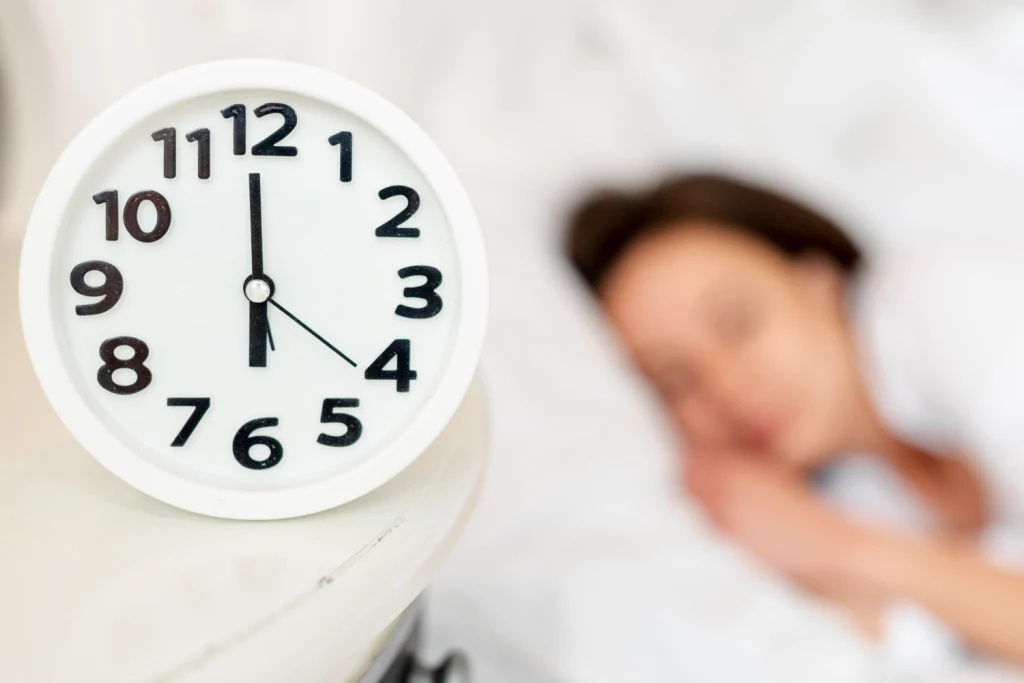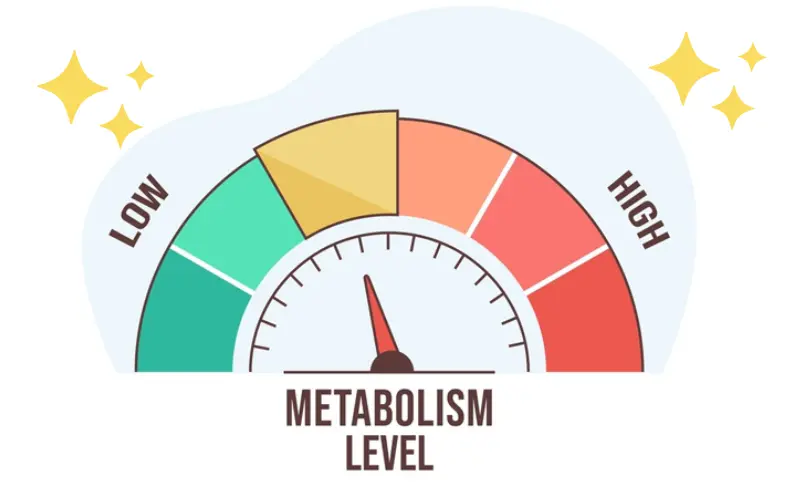How to Get Proper Sleep at Night? (10 Proven Tips To Follow)
Need expert advice for better sleep? You’re in the right place!
Are you tired of tossing and turning every night, waking up groggy and irritable? You’re not alone!
In today’s fast-paced world, proper sleep often feels like an elusive dream. Many of my clients struggle with poor sleep, feeling the impacts on their mood, health, and productivity.
But here’s the good news: achieving restful, rejuvenating sleep is within your reach. I’m here to guide you through practical tips and science-backed strategies to transform your nights. Say goodbye to restless nights and hello to a healthier, more energized you!
How Sleep Affects Your Health, Weight & Mode?

Let’s dive into why sleep is such a big deal for your overall health, weight, and mood. It’s more than just feeling tired or grumpy; poor sleep can have a significant impact on various aspects of your well-being. Here are some key areas where sleep plays a crucial role:
1. Hormonal Imbalance:

Lack of sleep can throw your hormones out of whack. This includes ghrelin and leptin, which regulate hunger and satiety. When these hormones are unbalanced, you’re more likely to overeat and crave unhealthy foods, contributing to weight gain.
Research has shown that sleep-deprived individuals have higher levels of ghrelin (the hunger hormone) and lower levels of leptin (the satiety hormone), making it harder to control food intake and maintain a healthy weight.
2. Weakened Immune System
Your body uses sleep to repair and strengthen your immune system. Without enough quality sleep, your immune response weakens, making you more susceptible to infections, and other illnesses.
Studies have found that people who don’t get enough sleep or who experience poor sleep quality are more prone to get affected by common illnesses.
For example, one study published in JAMA Internal Medicine showed that those who slept less than 7 hours per night were almost 3 times more likely to develop a cold compared to those who slept 8 hours or more.
3. Mood Disorders & Emotional Regulation

Ever notice how a poor night’s sleep can make you feel irritable or overly emotional? That’s because sleep is essential for emotional regulation. Chronic sleep deprivation is linked to mood disorders like anxiety and depression, affecting your mental health significantly.
4. Reduced Physical Activity

When you’re tired, you’re less likely to exercise. This not only impacts your fitness goals but also your overall energy levels and metabolism. Regular physical activity is vital for maintaining a healthy weight and boosting your mood. Sleep plays a pivotal role in making sure you have the energy to stay active.
5. Cognitive Function
Sleep is critical for brain health. It aids in memory consolidation, decision-making, and learning. Lack of sleep impairs cognitive functions, leading to poor concentration, memory issues, and slower reaction times. This can affect your performance at work and even your safety in everyday activities.
Research published in Nature Reviews Neuroscience has shown that during sleep, the brain clears out toxins that accumulate during the day, which is crucial for cognitive function and overall brain health.
6. Heart Health
Poor sleep can also have a negative impact on your cardiovascular health. Chronic sleep deprivation is linked to increased risks of hypertension, heart disease, and stroke. Quality sleep helps regulate blood pressure and promotes heart health, which is vital for your overall well-being.
A study in the American Natural Library of Medicine found that short sleep duration is associated with a greater risk of developing cardiovascular diseases, emphasizing the importance of adequate sleep for a healthy heart.
Top 10 Proven Tips For Better and Deeper Sleep at Night:
Ready to enjoy better and deeper sleep? Here are ten proven tips to help you drift off easily and wake up refreshed.
1. Maintain a Regular Sleep Schedule

Consistency is key to a healthy sleep routine. Stick to the same wake-up and bed times, even on weekends and holidays. This helps stabilize your sleep-wake cycle and improves overall sleep quality.
Your body thrives on routine, and maintaining consistent sleep and wake times reinforces your natural circadian rhythms, leading to better sleep efficiency and less daytime fatigue.
2. Eat a Balanced Diet

What you eat can significantly impact how well you sleep. A balanced diet rich in fruits, vegetables, whole grains, and lean proteins supports healthy sleep patterns. Foods high in vitamins and minerals, like magnesium and calcium, promote relaxation and sleep.
Avoid heavy meals and spicy foods close to bedtime as they can cause discomfort and indigestion, making it harder to fall asleep. Also, limit caffeine and sugar intake in the evening to avoid stimulating your nervous system.
3. Create a Relaxing Sleep Environment
Transform your bedroom into a sleep sanctuary. Keep it cool, quiet, and dark to create an ideal sleep environment. Invest in a comfortable mattress and pillows that support your body, like this.
If you’re a hot sleeper like me, invest in cooling sheets, like these.
I’m obsessed with these cooling sheets and will never use anything else.
Use blackout curtains, like these to block out light and consider a white noise machine or earplugs to drown out disruptive sounds.
Keeping your bedroom tidy and clutter-free can also help reduce stress and promote relaxation, making it easier to drift off to sleep.
4. Maintain a Regular Exercise Routine
Regular physical activity can improve sleep quality and duration. Aim for at least 30 minutes of moderate exercise on most days. I recommend Mat Pilates workout which is a low-impact, high-reward exercise routine that can be done right in the comfort of your home.
Exercise helps regulate sleep patterns and reduces symptoms of insomnia and sleep apnea.
However, avoid vigorous activity close to bedtime as it can increase adrenaline levels and make it harder to fall asleep. Instead, opt for relaxing activities like stretching or yoga in the evening to help unwind and prepare your body for rest.
5. Avoid Late Night Meals and Alcohol Consumption

Eating large meals or consuming alcohol late at night can disrupt your sleep. Try to have your last meal at least 2-3 hours before bedtime. Late-night eating can lead to indigestion and discomfort, making it harder to fall asleep.
Alcohol, although it may initially make you drowsy, can interfere with your sleep cycle and reduce sleep quality. If you drink alcohol, do so in moderation and allow time for your body to metabolize it before bed.
6. Practice Stress Management
Stress and anxiety are common sleep disruptors. Incorporate relaxation techniques into your bedtime routine to calm your mind. Deep breathing exercises, meditation, and yoga can help reduce stress and promote relaxation. Even a few minutes of mindfulness practice before bed can significantly improve your sleep quality.
7. Avoid Blue Light After Sunset
Exposure to blue light from screens can interfere with your sleep hormones, particularly melatonin, which regulates your sleep-wake cycle. Limit your use of phones, tablets, and computers at least an hour before bed.

If you need to use electronic devices, consider installing blue light filters or wearing blue light-blocking glasses in the evening. Reducing blue light exposure helps signal to your body that it’s time to prepare for sleep, making it easier to fall asleep naturally.
I highly recommend these blue light blocking glasses featuring a women’s eyewear frame. I have 4 pairs and they work really great.
8. Don’t Check the Clock

Constantly checking the clock during the night can create anxiety, making it harder to fall back asleep. Turn your clock away from you, or remove it from your bedroom altogether.
Trust your body’s natural ability to wake you up when needed. Focusing on the time can increase stress and make it harder to relax, prolonging the time it takes to fall back asleep.
9. Don’t Deal with Anxiety-Inducing Situations Right Before Bedtime:
Avoid discussing stressful topics or tackling anxiety-inducing tasks right before bed. Create a calming pre-sleep routine to help your mind unwind. Read a book, listen to soothing music, or take a warm bath to relax.
Engaging in calming activities before bed can help ease your mind and prepare your body for a restful night’s sleep.
10. Limit Naps
While naps can be refreshing, long or late-day naps can interfere with nighttime sleep. If you need to nap, keep it short—20 to 30 minutes—and avoid napping late in the afternoon. This helps ensure you’re tired enough for a good night’s sleep.
Final Words:
These tips can make a world of difference in your sleep quality. Try incorporating them into your routine and enjoy the benefits of restful, rejuvenating sleep.





